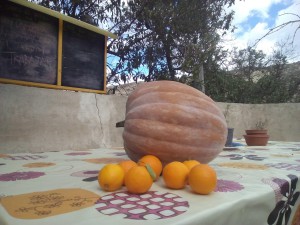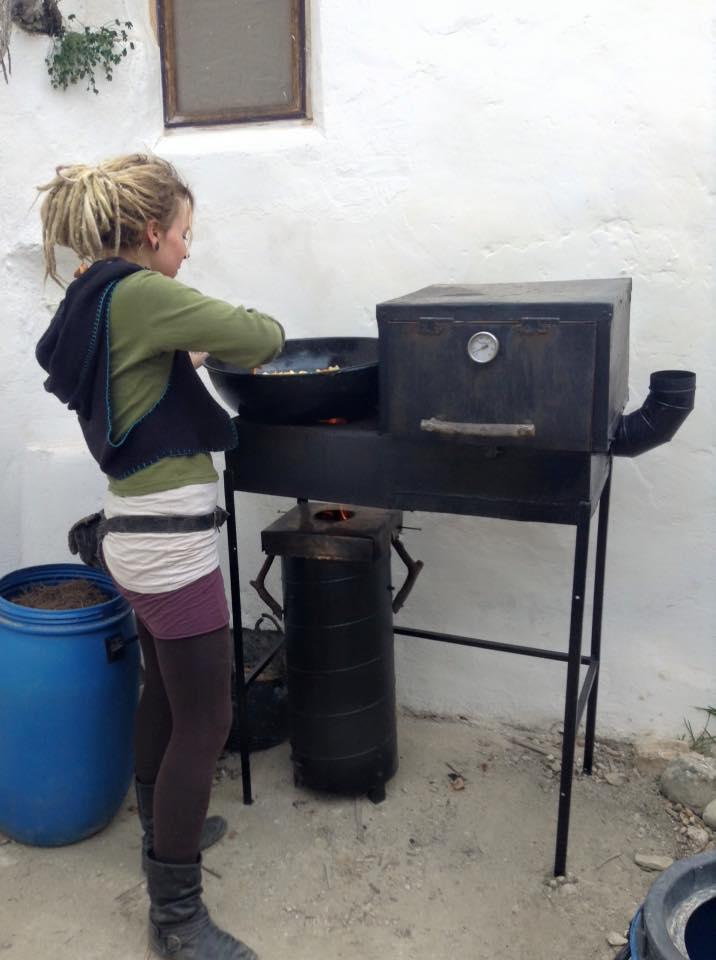Sustainable Living
Our Sustainable Living coordinator, Luke, attended ConSolFood – a conference on Solar Thermal Food Processing in Faro, Portugal – to further his and Sunseed’s knowledge about advances in solar cooking. Here he reflects on lessons from solar technology across the globe – and offers a challenge for Sunseed in the future.
On leaving the crystalline valley of Los Molinos, I bid farewell to the fresh and chilling moonlight that swept across the desert. The journey to Faro, Portugal, had begun especially early in the morning and by midday we had already navigated through the streams of mist and dew that laced the foothills of the Sierra Nevada. By the time I had reached the beautifully ornate archways of Sevilla, the whiteness of the mists had spread to the sky, covering the entire city in a pallid blanket of rain. My optimism of having sunshine for the solar conference started to falter – luckily what was soon to come would open my eyes and heart to the warmth and brilliance found in the Portuguese Algarve.
The conference named ConSolFood 2016 (i), was an event organised with the intention of unifying pioneering individuals and forward thinking organisations; thereby dispersing technological advancements in solar cooking, and most importantly, spreading cultural immersion and collective action across the world.
For a small conference hall in the University of Algarve, an astonishing number of nations had been represented; and especially refreshing was the presence of individuals from India, South America (Chile, Mexico, Brazil) and Africa (Nigeria, Kenya, Cameroon, Uganda and South Africa). Many of the technological advances of solar cooking may be taking place in Western countries, especially Germany; however, the implementation and fruits from this technology are clearing flourishing in the sun-drenched climes of the world.

We were blessed with strikingly beautiful weather considering the previous day’s lack of brilliance – which meant we were able to enjoy the delicious dishes prepared by the participants on the Saturday. However, it was not only the food that took the stage over the two days – instead, it was the passion, inspiration and infectious enthusiasm that sparked the fire which kept the conference’s vision alive.
PRESENTATIONS
The diverse array of keynote speakers meant that a whole spectrum of information was discussed; from articulate technical conversations, to inspiring success stories from across the globe, and also broad discussions about how we can take positive steps in our global journey of change.
Of the lectures given, some that left a particular impression included: Solar Cooking in the Antarctic & Solar Restaurants in the Desert (Serrano-Rodríguez, 2016), Solar Food Processing in Ashrams of India (Gandhia, 2016), bridging the gap between Solar Cooking Technology and Sustainable Social Development (McGilligan, 2016); and also an inspirational presentation about the Key Disruptors holding back the spread of solar cooking technology (Greene, 2016).

A clear consensus was reached regarding the principal importance of having more awareness and training in the use of solar cookers. The technology is at the right level, however depth and span of use is not integrated enough. One speaker, Pedro Serrano-Rodríguez from Chile, confidently commented that the “challenge of using solar cookers is not technical, at least 60% of the lack of impetus is purely cultural” (ii.)
There is no doubt in my mind that this statement has validity, especially having seen first-hand the simplicity of solar cooking, and its unquestionable effectiveness.
Nonetheless, the spread of solar cooking is taking huge leaps in places like India, somewhat hidden to the Western audience. Talks from Deepak Gandhia (iii) and Janak Palta McGilligan (iv) respectively, demonstrated that the potential and implementation of this appropriate technology is catching like wildfire; especially because we are becoming open to the flexibility of each culture. For example Crosby Menzies (v), participant from South Africa, pioneer and Founder of SunFire Solutions, discussed how Parabolic Cookers are more common in South Africa (due to a lack of good quality Box Cookers); whereas India has a healthy variation of both Parabolic and Box Cookers, and in comparison North Africa demonstrates more availability of Box and Fireless Cookers to the general population. A clear lesson was noted that we must listen to the needs of the audience, rather than trying to create a one-size-fits-all solution to clean cooking technologies.

Also an especially fascinating and empowering talk given by Julie Greene (vi), from Solar Cookers International, encouraged us to contemplate deeper on our perceptions of energy production. Ms Greene quite accurately commented that “we have become accustomed to buying energy from a supplier – which ultimately disempowers us from the reality that energy is essentially free – we can harness it ourselves”. This statement left a lasting impression in my mind, and begun a current of inspiration that soon flooded my ideas of the future with opportunity. Ms Greene finished her presentation with a dream of transition; where solar energy could take the centre stage for our cooking needs, seconded with the use of Biomass/Biogas, and only as a final alternative we resort to fossil fuel-based energy.
Carrying on from that final point, one key lesson I took from the conference, it is that Sunseed Desert Technology (vii) has the fertile soil to cultivate a movement away from, or even completely cut our reliance on LPG (Gas). This would take no new introductions to our solar cooking equipment, and with only minor changes to our daily activities – yet with serious improvements to our nutrition, sustainability, education potential and our ability to adapt to the changing times.
CONCLUSION
We desperately need a change in our cultural perception regarding this technology – especially given the myriad of benefits it brings, on an environmental, social, economic and even spiritual basis. The illusions of First and Third World countries are rapidly fading from the textbooks, and so is the myth that only poor people need to use solar cookers – the reality that is dawning upon humanity is that this type technology is for us ALL to use, even to the extent where we NEED to use it.
Also a special thanks to Celestino Ruivo (viii), who with the help of his students managed to organise the whole event and bring together a group of caring, inspirational and intelligent people, from all corners of the Earth.
Obrigado.
If you would like any further information on a specific lecture topic, or a particular presenter, please feel free to get in touch at: sustainable.living@sunseed.org.uk
For a list of the presentations and the individual slides given at ConSolFood 2016, please see the link below: http://www.consolfood.org/download/
i.ConSolFood: International Conference on Advances in Solar Thermal Food Processing. University of Algarve, Faro, Portugal. January 22-23, 2016
ii. Pedro Serrano-Rodríguez, Solar Cookers in the Antarctic, Solar Restaurants in Desert Areas, use as Adaptable Solar Dryers. ConSolFood 2016. U. De Algarve. Portugal.
iii. Deepak Gadhia, Chief Mentor, EnerSun Power Tech P. Ltd & Trustee of Muni Seva Ashram, India
iv. Dr. Janak Palta McGilligan, Jimmy McGilligan Centre For Sustainable Development, India
v. Crosby Menzies, Founder & CEO SunFire Solutions, www.sunfire.co.za
vi. Julie Greene, Executive Director, Solar Cookers International, www.solarcookers.org, Key Disruptors for the 21st Century, ConSolFood 2016. U. De Algarve. Portugal.
vii. Sunseed Desert Technology, Almeria, Los Molinos Del Rio Aguas; www.sunseed.org.uk
viii. Dr. Celestino Rodrigues Ruivo, University of Algarve-Portugal
Sustainable Living Department, Sunseed Desert Technology
Los Molinos del Rio Aguas, Sorbas, Almeria, Spain, 04270
Sustainable.living@sunseed.org.uk, www.sunseed.org.uk
























